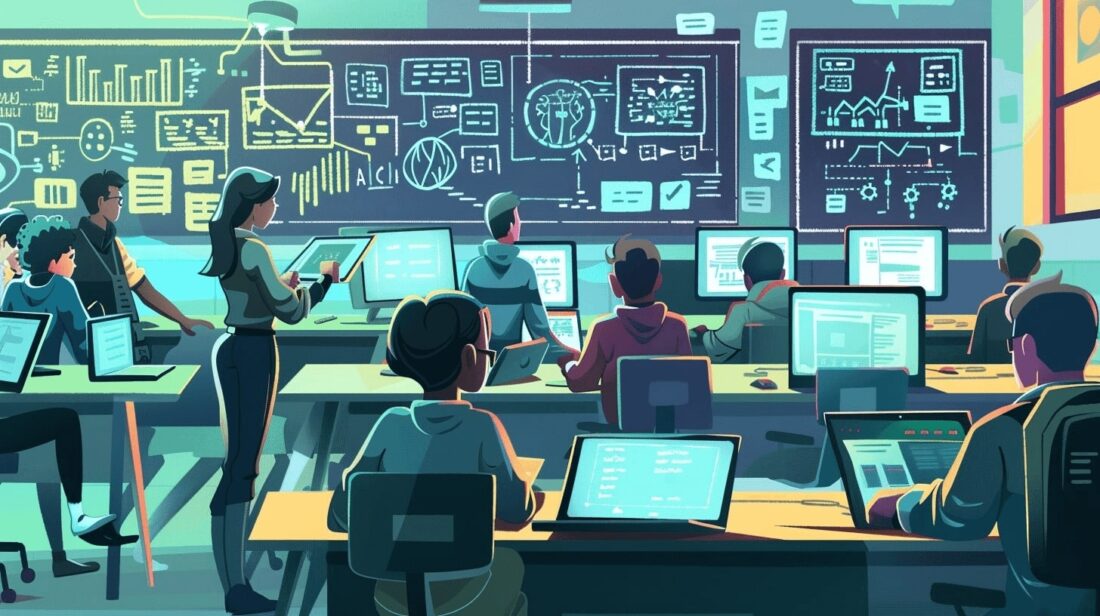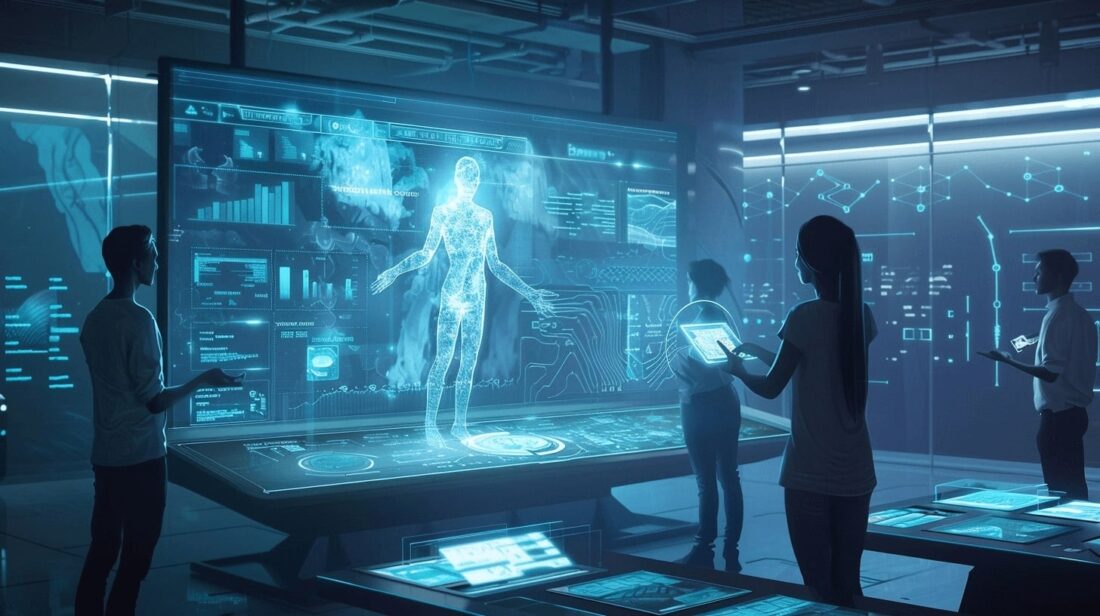What does AI software development mean for the coding professional today? Swift productivity gains, a redefined developer role, and enhanced code quality are just the beginning. This no-nonsense guide cuts through the hype to show you the practical impact of AI on software engineering, the challenges of integrating AI tools like GitHub Copilot, and the essential skills developers need to thrive in this AI-enhanced era.
Key Takeaways of AI Software Development
- AI is revolutionizing software development by automating routine tasks, enhancing productivity, and creating more sophisticated software solutions. Advanced technologies such as GitHub Copilot, AlphaCode, and AskCodi are aiding developers in code generation, translating natural language into programs, and optimizing workflows while introducing new challenges in integration and data privacy.
- Using AI in software demands new skills from developers, including a deep understanding of AI concepts and ethical considerations, while encouraging collaboration between AI systems and human ingenuity to maintain competitive advantage.
The AI Revolution in Building Software
The advent of AI in building software has been nothing short of revolutionary. By automating tasks and unlocking new business insights, AI enables unprecedented efficiency and sparks innovation. We’ve seen this transformative power first-hand in our work with AI tools like Devin, an AI software assistant. Devin has improved performance by solving significantly more software problems than previous models. But this doesn’t mean that AI is here to replace us, far from it. Devin is designed to assist us in taking on routine coding tasks and allow us humans to focus on complex challenges.The interplay between AI capabilities and human innovation potentiates the creation of more robust and sophisticated software solutions. As AI gains experience, it becomes more adept at handling intricate coding issues. This learning and adaptation ensure AI’s effectiveness and relevance in the rapidly evolving tech landscape. Our roles in tech development are evolving to incorporate AI assistance, focusing on collaboration over replacement.
The Role of Generative AI
Generative AI stands as a revolutionary force. It serves almost like an additional intellect that absorbs lessons from previous successful designs and anticipates potential technical difficulties. The ability to craft optimized software structures has been crucial in streamlining our workflow processes, elevating customer service quality, and promoting more rapid decision-making.
Introducing generative AI into the software creation process extends beyond mere task automation. It enriches those tasks. For instance, tools augmented by generative AI have markedly improved our approach to planning for software requirements. These innovative tools offer insights grounded in data analysis and refine how we allocate workloads on cloud platforms. Consider the prospect of boosting developer efficiency between 10% and 30% during initial implementation phases—such is the transformative influence of generative AI.
Productivity Gains with AI Augmentation
The impact of AI enhancement on the economy within the software creation process is substantial. Integrating AI tools with natural language processing has enhanced our grasp of complex code and its documentation. This advancement has propelled swift progress in creating innovative software and substantial increases in productivity for developers like us. Merging human intelligence with AI in tech development magnifies efficiency, ensuring solutions are precisely customized to user needs.
The Boston Consulting Group estimates suggest that developer augmentation utilities can lead to 30% and 50% productivity surges. Imagine being able to expedite your coding operations twofold. Such a leap in productivity exemplifies what we’re witnessing due to AI-assisted advancements. Looking ahead, the future of tech innovation isn’t just about increasing output but significantly improving quality.
Empowering Developers with AI Tools

Artificial intelligence tools are transforming how we code, empowering us, the developers, and leading the AI revolution in crafting digital solutions. GitHub Copilot, Microsoft’s Intellicode, and Jasper are at the forefront of the AI transformation in digital solution creation, providing extensive code suggestions from repositories. These tools significantly aid us in crafting high-quality code.
But it’s not just about code generation. AI tools such as AlphaCode by DeepMind and AskCodi by Assisttiv.ai adeptly translate descriptions in natural language into computer programs, leveraging advanced natural language processing techniques to offer real-time coding assistance. This represents a transformative shift in code development practices. Yet, integrating these sophisticated artificial intelligence tools into our existing workflows, ensuring they complement established software development methodologies, and smoothly working with existing code remains challenging.
It’s a complex process, but the benefits are worth the effort.
Enhancing Code Quality with Intelligent Systems

AI technologies have markedly elevated our code’s quality and uniformity. They:
- Automate routine code reviews
- Analyze complex codebases
- Use historical defect patterns within our code repositories to enhance the focus of quality assurance efforts.
We utilize AI to automate code generation, write unit tests, and explain complex code sequences. During the scanning or threat modeling phases, AI algorithms aid in securing our software by proactively identifying vulnerabilities. These intelligent systems have proven to be invaluable in enhancing code quality.
Streamlining Repetitive Tasks
One of the most significant benefits of AI in software development is the automation of repetitive tasks. This allows us, the developers, to focus on complex problem-solving. AI tools enhance our productivity by automating tasks like debugging, learning from past experiences to provide solutions for fixing bugs, and automating testing processes through learning from previous tests.
This powerful collaboration between AI tools and us, the engineers, is a game-changer. Automation handling data entry, scheduling, and routine coding allows us to apply our skills to more innovative and complex challenges. It’s like having a dedicated assistant who never tires and continuously learns.
Navigating the Challenges of AI in Development
While AI offers vast possibilities in crafting digital solutions, it also introduces significant risks. These include injecting biases into systems and raising ethical concerns. As developers, we need advanced skills to manage high-quality datasets, monitor performance, and collaborate closely with AI and data science teams to effectively integrate AI tools into our workflows.
Furthermore, incorporating AI in the tech realm has stirred both excitement for productivity prospects and job security concerns among developers. One key challenge with AI in software development is ensuring data privacy and safeguarding user information. Despite these challenges, the potential benefits of AI in software development are too significant to overlook.
Ethical Considerations and Bias Mitigation
Responsible AI development requires ethical frameworks, especially as AI systems gain autonomous decision-making capabilities in digital solution creation. Ethical considerations in AI necessitate human oversight to align AI actions with human values and ensure regulatory compliance.
Building trust in AI systems relies on the following:
- Accountability for AI decisions and how any errors are managed
- Ensuring the fairness of AI-driven technology and safeguarding against ingrained biases that can result in discrimination.
- Integrating measures into AI systems to check and counteract biases that may arise due to prejudiced training data
- Safeguarding against unfair decision-making processes
These are significant ethical priorities in AI systems.
Ensuring Data Privacy in AI Systems
The integration of AI in the development process has highlighted the importance of data security and privacy. Given that AI systems typically require access to vast quantities of data, some of which may be sensitive, managing this information securely while adhering strictly to privacy laws is imperative.
When implementing AI technologies in software engineering processes, it is essential to implement stringent protections for user data to prevent misuse or improper handling. Ensuring that our AI tools operate with a strong commitment to respecting and maintaining user privacy is necessary for developers striving to avoid infringements on data security and privacy.
Skills for the AI-Enhanced Developer

Incorporating AI tools into digital solution creation transforms the tech professionals’ job market. Essential skills include:
- Grasping core AI principles, particularly generative AI and tools like ChatGPT
- Mastery over sophisticated sectors such as deep learning
- Proficiency in building models using platforms like Keras within Python
Prowess in managing data—encompassing tasks from data wrangling to crafting packages with programming languages such as R—augments our repertoire centered on AI. Yet it is arguably most imperative that we adopt an ethos geared towards relentless learning and adaptation to keep pace with the fast-moving advancements synonymous with AI and machine learning technologies. This adaptive skill set stands out as perhaps our paramount advantage.
Bridging the Skills Gap
Integrating AI tools into creating digital solutions transforms the employment landscape, prompting some to speculate whether AI might one day substitute software developers. Even those new to tech development can generate sophisticated code with AI’s help, shifting talent acquisition strategies. To stay abreast of these AI, software engineering, and data science advancements, we as programmers must continually develop our skill sets.
To initiate this transformation securely, companies are beginning by incorporating low-risk applications of AI while emphasizing enhancing their employees’ proficiency to handle these emergent AI tools effectively. By doing so, we can close any existing skills gap and secure our position within an evolving development ecosystem increasingly influenced by AI capabilities.
Collaboration Between AI Teams and Developers
Developers are crucial in teaming up with AI specialists to create user-centric solutions. Integrating AI systems should focus on human-centric designs that cater to user requirements rather than just showcasing technological capabilities.
In this cooperative process, we, as software developers, bring vital strategic knowledge and imaginative contributions beyond what AI can mimic. It’s a mutually beneficial partnership where artificial intelligence and our expertise amalgamate to forge cutting-edge software solutions.
AI’s Broader Impact on Software Development Processes

AI’s influence on software development transcends mere support with coding. AI is anticipated to serve as an all-encompassing instrument that improves every aspect of the process. AI-powered tools stand ready to accelerate the prototype stage, enabling a swift transition from idea to functional design.
In 2024, there is an anticipation for a trend towards more interactive and tailored AI tools within software engineering, which will also likely be subject to heightened oversight. As this future unfolds, we must stay flexible and adjust in response to these advancements.
From Code Generation to Project Planning
AI plays a significant role in project planning, from requirement gathering to predictive analysis for resource estimation and potential project challenges. AI-driven tools like ClickUp combine software development tools with project management features. These tools enhance project planning by:
- Evaluating market trends
- Analyzing user feedback
- Gathering information from various online sources
- Devising user-centric project plans
AI also assists us in project management by leveraging predictive analytics to estimate the necessary time resources and identify potential project challenges. It’s like having a crystal ball that can foresee potential roadblocks and help devise strategies to overcome them.
Improving Team Performance with AI Insights
Incorporating AI-driven insights into the software development process can elevate team efficiency, smooth out processes, and maximize output. Such tools apply AI to test applications rigorously, bolster their functionality, and deliver critical performance analytics. Systems are kept stable and dependable by real-time system performance monitoring through AI.
AI fosters an environment that boosts productivity and teamwork when embedded within data analysis procedures. Platforms such as Jira harness the power of artificial intelligence to oversee project milestones, organize tasks efficiently, and scrutinize individual contributions—this supplements conventional project management methods effectively. GitHub capitalizes on AI to refine collaborative efforts in code review sessions and manage pull requests more adeptly. Thereby not only advancing personal effectiveness but also strengthening collective team synergy.
Leveraging AI for Competitive Advantage
Companies can gain a competitive edge by using AI to:
- Fully leverage technological power through strategic expertise, operational frameworks, and information.
- Advance technological boundaries and enhance automated processes.
Facilitate the development of smarter systems, as seen with tools like StepSize AI, which offers AI-driven insights to optimize decision-making processes. This tool generates executive summaries and visual analytics that help firms execute strategic choices more effectively and with greater speed, much like having dedicated data scientists on board to provide rapid, actionable insights.
Customizing Machine Learning Models
Tailored machine learning models are crucial in deciphering consumer behaviors and inclinations within particular sectors. For example, BMW employs personalized artificial intelligence and extensive data analysis to acquire knowledge about customer requirements, thus providing a unique and customized user experience.
Such insights enable companies such as BMW not only to comprehend the desires of their clients but also to predict their future needs and tastes. Consequently, AI is revolutionizing not just the realm of software development but also reshaping the nature of client interactions.
Consulting Services for AI Implementation
Introducing AI into corporate settings necessitates a well-crafted plan for selecting the appropriate tools that align with organizational objectives, maintaining an ongoing dedication to skill enhancement, and managing data effectively. Firms like Koombea provide essential consulting services that help organizations navigate this complex integration.
Koombea has a history of helping businesses harness the power of digital innovation, focusing on integrating AI technologies to drive growth and efficiency. We offer strategic insights, technical expertise, and a collaborative approach to ensure that AI implementations align with business goals and provide sustainable value. Our experts work closely with clients to develop a comprehensive understanding of their unique challenges and opportunities, delivering custom AI solutions that enhance operations, customer experiences, and competitive advantage.
Summary
AI is revolutionizing the software development industry by boosting efficiency, spurring innovation, and expanding transformative capabilities. It plays a crucial role in every stage of the software development process—from automating mundane tasks to improving code quality and advancing project management to bolstering team performance. Integrating AI into this field also introduces challenges like ethical dilemmas, biases issues within machine learning models themselves), and data privacy concerns, necessitating ongoing education and adaptability.
To fully harness the power of AI technology, companies must take a strategic approach: tailor their machine learning models for specific organizational requirements and seek expert guidance throughout implementation stages. As developers engaged at the leading edge of this shift towards an AI-driven era in software development, we are experiencing an undeniably thrilling time.
If you’re ready to embrace the potential of AI software development, reach out to Koombea. Our team of experts can guide you through the complexities of AI Software development and integration, ensuring your projects benefit from the latest advancements in AI technology.
Frequently Asked Questions
What software is used to develop AI?
The best software for developing AI is usually determined by comparing different options available in the market, such as TensorFlow, PyTorch, and Google Cloud’s AI platform.
Is AI replacing software developers?
AI is not on track to supplant software developers. Although AI may enhance efficiency and generate a greater need for programmers, it can’t take over from top-notch developers who craft intricate and pioneering software solutions.
What does an AI software engineer do?
A software engineer specializing in AI is responsible for designing, building, and deploying AI systems while communicating their intricacies to stakeholders. Such professionals are at the core of developing AI applications—they code the intelligence that drives these systems, conduct rigorous testing procedures, and continuously track advancements within the field of artificial intelligence.
What are the challenges of integrating AI into software development?
Incorporating artificial intelligence into software development brings a set of hurdles, including ethical dilemmas and issues around bias and data privacy, and requires ongoing education and adaptability. Developers must navigate a steep learning curve to effectively integrate AI tools into existing development processes and ensure they complement rather than disrupt established workflows.
Does AI Replace Software Engineers?
While AI enhances efficiency and opens new avenues for innovation, it’s crucial to understand that it complements rather than replaces software engineers’ unique insights and creative problem-solving abilities. The integration of AI in software development automates routine tasks. It can expedite coding processes, but the role of software engineers evolves to focus more on higher-level design, strategy, and complex problem-solving that AI is not equipped to handle. As we embrace AI, the industry is witnessing a shift towards a more collaborative model where engineers leverage AI to augment their capabilities, ensuring that the future of software development is a partnership between human intellect and AI.
How is AI improving code quality?
AI is elevating the consistency of code quality by automating standard code reviews, scrutinizing intricate codebases, and sharpening the focus on quality assurance processes in AI software development. To enhance code quality, machine learning algorithms and AI systems analyze historical defect patterns within code repositories. At the same time, AI-powered tools assist in generating unit tests and explaining complex code sequences. These technologies help to maintain high standards of quality and security throughout the software development lifecycle.
Conclusion
Integrating AI into software development is a transformative force reshaping every aspect of the industry. AI makes an indelible impact by enhancing the efficiency of coding processes with code suggestions and automating repetitive tasks to leverage deep learning and neural networks for complex problem-solving and predictive analytics. Furthermore, AI tools like large language models and AI-driven project management platforms are streamlining resource allocation, boosting team performance, and improving business outcomes.
As developers and engineers continue to harness the power of AI, it is essential to remain vigilant about the ethical implications and challenges that come with it. By fostering a culture of continuous learning and adaptation and working closely with AI specialists and data scientists, the software development community can ensure that AI is used responsibly and effectively to enhance their work’s creative and technical aspects.
The journey towards an AI-powered future in software development is full of potential. By understanding and embracing AI capabilities in AI software development, developers can unlock new levels of innovation and efficiency, transforming challenges into opportunities for growth and advancement in the rapidly evolving digital landscape. Ready to leverage these opportunities? Discover how Koombea can help you navigate and excel in AI software development.
